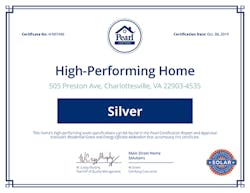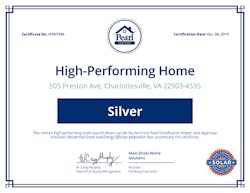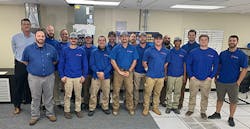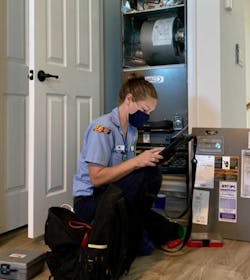As HVAC contractors, your mission is to provide comfortable homes and buildings for the people who live and work in them by properly servicing and maintaining heating, cooling and humidification systems. And you want to do that with the most energy-efficient solutions your customers can afford.
But what about when your customers want to sell those energy-efficient buildings? How do they leverage these state-of-the-art systems and the subsequent energy savings to sell for a good price? On the commercial side, real estate agents have already tapped into energy performance data to help sell commercial and industrial structures, notes Cynthia Adams, co-founder and CEO of Pearl Certification.
“Commercial buildings, which had Energy Star or LEED ratings, were renting, assessing, appraising and selling for more,” she says. “Real estate agents were savvy on how to market these buildings in such a way that underscored the benefits of an energy-efficient structure — lower operational costs, better indoor air quality, better working environment and more comfort. And it was having a real impact on the value of those buildings.”
“The information about a house that makes it high-performing isn't something readily visible to your average homeowner and the professionals who have the eyes to see it and understand it,” Adams says. “HVAC contractors weren't contributing that information in any meaningful way to a future transaction. There was no one collecting the information to be used by an agent, a buyer, an appraiser or a lender to impact the home's value.”
“You're not going to be able to train real estate agents or appraisers to become energy professionals,” Adams notes. “Nor will you be able to do it with homeowners. Someone needs to collect the data on the home’s performance features from the contractor or the builder so it can accurately be displayed and explained in terms of the benefits to those interested. Our solution was a third-party certification system.”
However, the focus of Pearl Certification isn’t new construction, she adds — it’s the “hundred million existing homes in need of an upgrade or were in the upgrade process and weren't able to capture a monetary ROI from that type of home improvement.”
Adams explains how Pearl is different from a HERS rating. The HERS rating system was developed for new construction, a “one and done label.” It’s based on energy modeling — looking at energy use in the house per square foot, comparing that home energy use to a code-built home and assigning a numerical rating.
Pearl uses an asset-based approach. Silver, gold and platinum scores are based on how home features contribute to its energy performance in five categories: building shell, heating and cooling, baseload, home management, and renewable energy/energy storage.
“We take the long-view approach on the home,” she says. “As homeowners make additional improvements, they or their contractors can share the information with Pearl, and we can update their homes’ score and certification. So, it's a living record of a home’s performance that’s available to a new buyer if the home should sell.”
By Invitation Only
To collect this data, Pearl enlists the help of HVAC contracting firms across the country. But not every firm has a shot; only the top HVAC contractors are invited to join Pearl.
HVAC contractors see their involvement with Pearl as an advantage to their businesses and their customers.
“The level of detail to quality was really enticing,” says Jaime DiDomenico, president of Sarasota, Fla.-based Cool Today. “We already have very high standards for making sure we stand behind all warranties and guarantees, but to have a third party certify these attributes is a game-changer. It shows our prospects, especially first-time clients, that we have passed rigorous testing requirements in the areas of quality and customer service.”
Cody Novini, president and CEO of SoCal Airflow Pros (Rancho Santa Margarita, Calif.), agrees: “It's a nice benefit to have third-party backing, to prove to clients that what we're saying is a reality. And it helps clients sell their homes for more — they’re leaving behind a more efficient home and getting reimbursed for that investment. I think it's a win-win for all parties, including the new homeowner, who now has a better system.”
Both firms explain the Pearl Certification process on their websites; Pearl also lists their contractor partners on its website so homeowners can easily find an authorized HVAC contractor in their local area. It also provides marketing material to its contractors.
Cool Today not only sends out Pearl Certification information to customers via email, but it also provides a certificate on each HVAC installation, DiDomenico notes.
Novini says it’s an educational process for customers, but once they get it, they’re on board. “And it’s a much better measure than a five-star Yelp review to differentiate SoCal Airflow Pros from our competition,” he explains.
Customers who have gone through the Pearl Certification process have a “sense of confidence” with the third-party validation, DiDomenico says.
“Many clients are selling their homes and moving out of state,” Novini notes. “They are happy to have more value to offer buyers than the neighbor’s house down the street that doesn’t have Pearl's proof of efficiency.”
Kelly Faloon is a contributing writer to Contracting Business magazine and principal of Faloon Editorial Services. The former editor of Plumbing & Mechanical magazine, she has more than 20 years of experience in the plumbing and heating industry and B2B publishing. Faloon is a journalism graduate of Michigan State University.
About the Author

Kelly L. Faloon
Freelance Writer/Editor
Kelly L. Faloon is a contributing editor and writer to Contracting Business magazine, Contractor and HPAC Engineering. The former editor of Plumbing & Mechanical magazine, Faloon has more than 20 years experience in the plumbing and heating industry. She started a freelance writing and editing business in 2017, where she has a varied clientele.
Faloon spent 3 1/2 years at Supply House Times before joining the Plumbing & Mechanical staff in 2001. Previously, she spent nearly 10 years at CCH/Wolters Kluwer, a publishing firm specializing in business and tax law, where she wore many hats — proofreader, writer/editor for a daily tax publication, and Internal Revenue Code editor.
A native of Michigan’s northern Lower Peninsula, Faloon is a journalism graduate of Michigan State University. You can reach her at [email protected].



